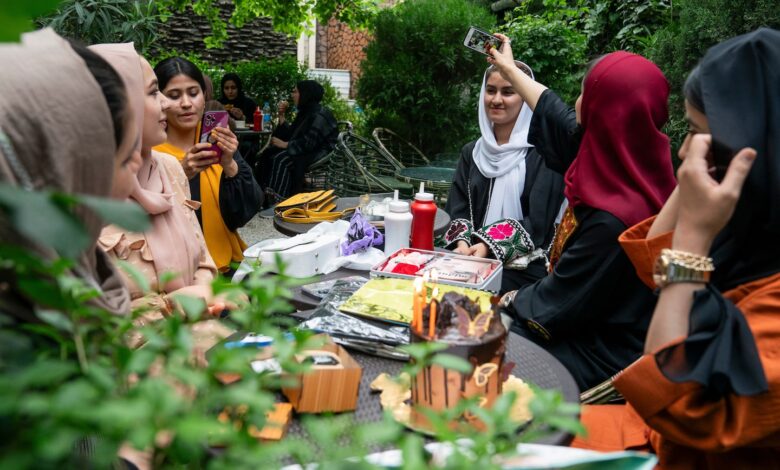As Taliban restricts options for Afghan women and girls, many live on online

But more than a dozen women and girls interviewed in Kabul said they worry that these havens might be short-lived. Many say they have to hide their Instagram and Facebook profiles from their families or that they self-censor their posts for fear of being discovered by the Taliban government.
Some spend so much time online that their friends worry about addiction. Others face torturously slow internet speeds, or — in rural areas — cannot get online at all.
“The internet is our last hope,” said Beheshta, 24. “But nothing can replace real freedom.” Like other women interviewed, she spoke on the condition that only her first name be used out of concern that her comments could draw the ire of government officials.
GET CAUGHT UP
Stories to keep you informed
The Taliban would be hard-pressed to ban social media platforms outright, and adopting Chinese-style controls over the internet would be expensive. Though the regime has banned TikTok for “un-Islamic content,” the Taliban is itself a heavy user of platforms such as YouTube and X, and government officials communicate via WhatsApp.
“Of course we want filters that reflect our Islamic values, but it’s expensive — and right now money is tight,” Zabihullah Mujahid, the chief government spokesman, said in an interview in the southern city of Kandahar. He added that the regime wants to stop users from “wasting their time.”
Hedayatullah Hedayat, a deputy information minister, said, “One day, we will have our own platforms.”
When the Taliban captured Kabul in August 2021, Efat, then 18, had just graduated from high school and been accepted into the psychology department at Kabul University. Her family wanted to flee the country but was deterred by the chaos at Kabul’s airport.
In the years since, she said, the internet has been a lifeline for her. Efat starts most of her days with fitness routines, watching workout videos on YouTube. During the day, she browses the internet, chats with former classmates and sells her paintings — she has made $200 so far — on an Instagram page she manages with her sister.
With women banned from public parks, Efat primarily finds inspiration for her paintings online. Her latest work shows a tiger. “Women can be just as powerful as them,” she said.
When the sun sets, Efat scrolls through her Instagram feed, where other artists post paintings of crying girls and of the huge Buddha statues in Bamian province that were destroyed by the Taliban in 2001. And she spends time on TikTok, eluding the ban by using VPNs, which encrypt online traffic and reroute it around the government’s internet filters.
“Without the internet, we’d all be shells of ourselves,” she said. “Half of my life now happens online.”
Many girls use the internet late in the evening and at night, when their friends are also online. When there is nobody to chat with, some turn to artificial intelligence.
Standing in a dimly lighted basement shopping mall where she sells women’s clothing, Sediqa, 23, said her new best friend is “Gipi,” a messaging bot that acts like a friend or language tutor. During long hours spent alone behind her shop counter, Sediqa often turns to the AI bot to chat. “It’s like a friend that’s always there for you,” she said. Another benefit, she said, is that her AI friend never makes fun of her.
“It feels like a safe space,” Sediqa said.
Earning and learning online
Eager to boost their household finances, some women have turned to cryptocurrency apps. Heela, 27, said she became a daily user of a crypto mining app after colleagues at work encouraged her.
Every 24 hours, she presses a button on an application called Pi Network and then lets her phone engage in crypto mining in the background for the rest of the day. (This process adds online transactions to a digital ledger called a blockchain and can create value.) The application is popular in Afghanistan because it works on ordinary mobile phones and is free, apart from the cost of the electricity it consumes.
But Pi Network’s monetary value is unproven because its currency, Pi, is not officially listed on major exchanges, where it could be traded for other cryptocurrencies or sold for U.S. dollars. Heela said she has yet to make money with it.
But for many Afghan girls, it’s just one more bet at a time when almost anything can feel like a gamble. Anecdotal evidence suggests that the practice is widespread, especially in Kabul.
Sadia, 27, earns money by selling dresses online. But she said she increasingly struggles to find models who let themselves be photographed. When she posts photos of models wearing her dresses, the online criticism is often immediate. In an apparent warning that she is being watched, she said, male critics add her WhatsApp account to groups that promote how to become a devout Muslim.
Digital businesses such as art sales and delivery services are largely tolerated by the government. The number of female-run online businesses in the country remains limited. While the United Nations Development Program says that efforts to expand digital payment systems show early signs of promise, their use is still rare.
Most of the women and girls interviewed in Kabul said they had signed up for at least one online education course since the Taliban took power.
Twice a week, Faryal, 22, sits in front of her smartphone and connects to the digital classroom where she teaches two courses, on media rights and criminal law, to dozens of female Afghan students. Such online classes are held on Google Meet and run by Afghan volunteers, often living abroad.
Faryal says the courses are an escape from boredom and resignation. “But there’s something about eye contact that’s difficult to replace,” she said.
The Taliban government has not explicitly banned online educational courses and could struggle to enforce such an order, given that many providers are headquartered abroad. But teachers and students worry that they might still be at risk.
When authorities earlier this year began to detain women for failing to properly cover their hair, rumors spread that police were checking all phones for evidence of participation in online classes. For weeks, Faryal said, she did not step outside with her phone.
Sajia, 23, who takes an English course online, said half of her class recently dropped out over concerns of a crackdown. “I don’t think they’ll return,” said Sajia, who decided to continue participating. “It’s so sad.”
The government has signaled it plans to step up scrutiny of internet use. Anyone who buys a SIM card for a cellphone can no longer remain anonymous and must provide an identity card and the contact details of five family members.
Anayatullah Alokozay, spokesman for the Ministry of Communications and Information Technology, said efforts to gather more data on Afghan internet users are meant to prevent abuse and fraud. But the changes to SIM card purchases have triggered widespread concerns about government surveillance.
In reality, the Taliban’s capabilities on this front still appear to be limited. Alokozay said Silicon Valley technology companies refuse to communicate with Afghan government officials. He said his ministry has repeatedly urged U.S. social media platforms to cooperate with Taliban government requests to take down content, such as those that impersonate other accounts, but without success. Even worse, Taliban officials say, the government’s own social media accounts keep being de-platformed.
Aria, 20, said she worries about the day the Taliban cracks down on online activity. “If the Taliban restricts the internet, we won’t have a choice but to flee for good.”
Lutfullah Qasimyar contributed from Islamabad, Pakistan.






